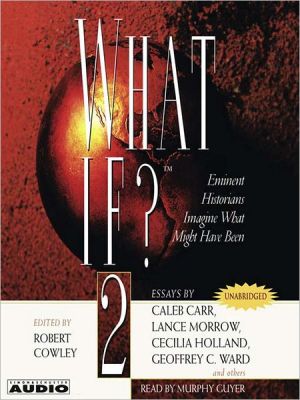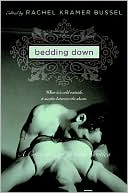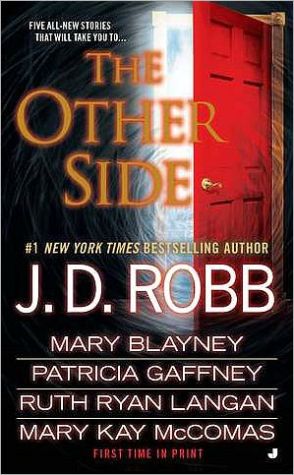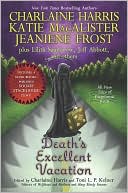What If...? Volume 3: The World's Foremost Military Historians Imagine What Might Have Been
Historians and inquisitive laymen alike love to ponder the dramatic what-ifs of history. In these never-before-published essays, some of the keenest minds of our time ask the big, tantalizing questions: Where might we be if history had not unfolded the way it did? Why, how, and when was our fortune made real? The answers are surprising, sometimes frightening, and always entertaining.\ This provocative collection of essays features today's foremost historians speculating on these "what ifs",...
Search in google:
Historians and inquisitive laymen alike love to ponder the dramatic what-ifs of history. In these never-before-published essays, some of the keenest minds of our time ask the big, tantalizing questions: Where might we be if history had not unfolded the way it did? Why, how, and when was our fortune made real? The answers are surprising, sometimes frightening, and always entertaining.This provocative collection of essays features today's foremost historians speculating on these "what ifs", providing a fascinating new perspective on history's most pivotal events. The essays include: Infectious Alternatives: The Plague that Saved Jerusalemby William H. McNeil No Glory That Was Greece: The Persians Win at Salamisby Victor Davis Hanson Conquest Denied: Alexander the Great's Premature Deathby Josiah Ober Furor Teutonicus: The Teutoburgby Lewis Lapham The Dark Ages Made Lighter: The Consequences of Two Defeatsby Barry S. Strauss The Death that Saved Europe: The Mongols Turn Backby Cecilia Holland If Only It Had Not Been Such a Wet Summerby Theodore K. Rabb The Immolation of Hernán Cortésby Ross HassigChronicles of High EducationIf rain, wind, and fog had not aided the Continental Army's desperate escape across the East River one night in August 1776, would we now be singing "God Save the Queen" at ball games? For Robert Cowley thinks that "counterfactuals," scenarios of how the course of history might have changed if some key event had unfolded differently. So he enticed 34 historians to contribute to a new book of essays: What If? The World's Foremost Military Historians Imagine What Might Have Been.
\ \ \ \ Chapter One\ \ \ WILLIAM H. McNEILL\ \ \ INFECTIOUS ALTERNATIVES\ \ \ The Plague That Saved Jerusalem, 701 B.C.\ \ \ Military events, even seemingly insignificant episodes, can have unforeseen consequences, ones that may not become apparent at the time they happen and occasionally not even for centuries. It seems appropriate to begin this book with such a moment in history, the Assyrian siege of Jerusalem, then the seat of the tiny kingdom of Judah, in 701 B.C. That siege, by Sennacherib, king of Assyria, was lifted after a large part of his army succumbed to a mysteriously lethal contagion. The Assyrians simply moved on: For the largest empire of its time, the reduction of yet another walled city was not cost effective. For those holed up inside, however, deliverance came as a heavenly sign (though its causes were probably environmental), and one that, needless to say, would have far-reaching implications. But what if disease had not intervened? What if the walls had fallen, and the usual pillage, rape, murder, and forced exile of the population had been Jerusalem's lot? What would our lives, our spiritual underpinnings be like 2,700 years later?\ Whatever the pestilence was, it became the leveler at Jerusalem. Disease has to be counted as one of the wild cards of history, an unforeseen factor that can, in a matter of days or weeks, undo the deterministic sure thing or humble the conquering momentum. History is full of examples. There was the plague that ravaged Athens for more than a year and led to its capture andthe dismantling of its empire in 404 B.C. An outbreak of dysentery weakened the Prussian force invading France in 1792 and helped to convince their leaders to turn back after losing the Battle of Valmy, thus saving the French Revolution. The ravages of typhus and dysentery are the hidden story of Napoleon's calamity in Russia. The war-vectored influenza epidemic of 1918 may not have changed immediate outcomes, but how many potential reputations did we lose to it--people who might have made a difference to their generation? Bacteria and viruses may thus redirect vast impersonal forces in human societies, and they can also become forces in their own right.\ \ \ * William H. McNeill, professor emeritus at the University of Chicago, won the National Book Award for his RISE OF THE WEST. Among his twenty-six other books are a survey of military history, THE PURSUIT OF POWER, PLAGUES AND PEOPLES, and, most recently, KEEPING TOGETHER IN TIME: AN ESSAY ON DANCE AND DRILL IN HUMAN HISTORY. In 1997, he received one of the most prestigious international prizes for a lifetime of distinguished scholarship, the Erasmus Award.\ \ \ * * *\ \ \ What if Sennacherib, king of Assyria, had conquered Jerusalem in 701 B.C. when he led his imperial army against a coalition of Egyptian, Phoenician, Philistine, and Jewish enemies, and handily defeated them all? This, it seems to me, is the greatest might-have-been of all military history. This may be an odd thing to say about an engagement that never took place; yet Jerusalem's preservation from attack by Sennacherib's army shaped the subsequent history of the world far more profoundly than any other military action I know of.\ From Sennacherib's point of view the decision not to press the siege of Jerusalem to a conclusion did not matter very much. The kingdom of Judah was only a marginal player in the Near Eastern balance of power, being poorer and weaker than Sennacherib's other foes. And the king of Judah had been well and truly punished for having dared to revolt against him. For as Sennacherib declared in an inscription on the walls of his palace at Nineveh that recorded the victories of the entire campaign, his army had occupied no fewer than forty-six walled places in the kingdom of Judah and compelled Hezekiah, king of Judah, to shut himself up in Jerusalem "like a bird in a cage."\ But, unlike other rebellious rulers in the area, Hezekiah did retain his throne, and the worship of Jahweh in the Temple of Solomon continued uninterrupted. Sennacherib's victory over the kingdom of Judah was therefore incomplete, a fact whose consequences were far greater than he or anyone else at the time could possibly imagine.\ Hezekiah (ruled ca. 715-687 B.C.) began his reign in a time of acute uncertainty. Seven years before he ascended the throne and became Jerusalem's thirteenth ruler of the house of David, the neighboring kingdom of Israel, comprising the larger and richer part of David's kingdom, met irretrievable disaster when an Assyrian army, commanded by Sargon II, captured the capital, Samaria, and carried off thousands of survivors to distant Mesopotamia. Strangers came at Assyrian command to cultivate the emptied fields, but they left the city of Samaria a shattered ruin.\ Did this mean that the God of Moses and of David, the selfsame God still worshipped in the temple that Solomon had built for him in Jerusalem, was no longer able to defend his people? Or had God punished the Israelites and their rulers for disobedience to his will as made known in sacred scriptures, continually refreshed and brought up to date by the inspired words of his prophets?\ The question was urgent, and all the more portentous because, if one took the second view, the God of Moses and of David had used the mightiest ruler of the age as an instrument for punishing his people, even though the Assyrians worshipped other gods and did not even pretend to honor God's commandments. This ran counter to common sense, which held that the gods worshipped by different peoples protected their worshippers as best they could. Victory and defeat therefore registered the power of rival deities as well as the strength of merely human armies. It followed that when the Assyrians began their imperial expansion, each new victory unsettled older religious loyalties and ideas among the peoples they conquered, creating a religious vacuum in the ancient Near East that was eventually filled by the unique response that occurred among the people of Judah.\ That response began to take shape when King Hezekiah embraced the view of a party of religious reformers who set out to purify the worship of Jahweh by concentrating it in the temple. Destroying "high places" in the countryside where other rituals prevailed was part of the program. So was respectful consultation with inspired prophets, among whom Isaiah, son of Amoz, was then the most prominent.\ But King Hezekiah did not rely entirely on supernatural help. He also strengthened Jerusalem's walls and expanded his borders modestly before joining the alliance against Sennacherib. And when the invading Assyrians defeated the Egyptians, he hurried to come to terms with the victors and had to pay dearly for the privilege of remaining on his throne, handing over various precious materials, including three hundred talents of silver and thirty of gold, some (perhaps most) of which came from the temple in Jerusalem. But he did retain his throne; and his heirs and successors maintained the little kingdom of Judah for another century and more by paying tribute to Assyria and carefully refraining from rebellion. Nevertheless, balancing precariously between rival great powers based in Egypt and Mesopotamia did not last forever. Instead, in 586 B.C., the kingdom's autonomy collapsed when Nebuchadnezzar, king of Babylon, did what Sennacherib had threatened to do, capturing Jerusalem after a long siege and bringing the dynasty of David to an end, destroying the temple, and carrying most of the surviving inhabitants off to an exile in Babylon.\ As we all know, this was not the end of Jewish history, for the exiled people of Judah did not pine away. Instead they flourished by the waters of Babylon, and reorganized their scriptures to create an unambiguously monotheistic, congregational religion, independent of place and emancipated from the rites of Solomon's destroyed temple in Jerusalem. Moreover, the revised Jewish faith, tempered in exile, subsequently gave birth to Christianity and Islam, the two most powerful religions of our age, and of course also retains its own, distinctive following around the world and especially in the contemporary state of Israel.\ None of this could have come to pass if the kingdom of Judah had disappeared in 701 B.C. as the kingdom of Israel had done a mere twenty-one years earlier in 722 B.C. On that occasion, the exiles from Israel soon lost their separate identity. By accepting commonsense views about the limits of divine power, they abandoned the worship of Jahweh, who had failed to protect them, and became the "Ten Lost Tribes" of biblical history. In all probability, the people of Judah would have met the same fate if the Assyrian army had attacked and captured Jerusalem in 701 B.C. and treated its inhabitants as they had treated those of Samaria and other conquered places before. If so, Judaism would have disappeared from the face of the earth and the two daughter religions of Christianity and Islam could not possibly have come into existence. In short, our world would be profoundly different in ways we cannot really imagine.\ But figuring out what actually happened before the walls of Jerusalem so long ago is quite impossible. Sennacherib's boastful inscription carved onto the walls of his palace of Nineveh is a piece of imperial propaganda rather than sober history; and the three biblical narratives that tell the story of how the Assyrians failed to take the holy city were shaped by ideas about God's miraculous intervention in public affairs that few historians accept today.\ Nonetheless, the biblical stories, inaccurate or exaggerated though they may be, were what really mattered. In all subsequent generations, they shaped Jewish memories of what had happened before the walls of the city, and this memory made it plausible to believe that the God of Moses and of David was in fact omnipotent, protecting his worshippers from the mightiest monarch of the day. This episode, as interpreted by the pious party in Jerusalem, made monotheism credible as never before; and emphatic uncompromising monotheism was what fitted the Jewish religion to survive and flourish in the cosmopolitan age that the Assyrian conquests had inaugurated. After all, mere local gods were hard to believe in when every part of the ancient Near East came to depend on what distant rulers, alien armies, and other groups of strangers did, and failed to do. Only God's universal power could explain public events satisfactorily. Consequently, Jewish monotheism prospered and was able to exercise an ever-widening influence, especially through its two daughter religions, down to our own time.\ Religious ceremonies tied to a single, sacred place did not suffice in such a world. But abandoning local, ancestral religion and accepting the gods of alien, imperial rulers, whose superior power had been demonstrated by success in war, was a craven, unsatisfactory response. Uniquely, the inhabitants of the small, weak, and dependent kingdom of Judah had the temerity to believe that their God, Jahweh, was the only true God, whose power extended over all the earth so that everything that happened was in accordance with his will. The circumstances of the Assyrian withdrawal from the walls of Jerusalem in 701 B.C. confirmed this implausible belief, proving God's universal power to pious and eager believers more clearly and far more convincingly than ever before. This makes it the most fateful might-have-been of all recorded history.\ The biblical version of the campaign appears three times over, in II Kings 18-19; II Chronicles 32; and the Book of Isaiah 36-37. The three accounts agree in all the essentials and in some instances even employ the same words and phrases. Let me quote from Isaiah, according to the King James version:\ \ \ Then Rabshakeh [commander of the Assyrian army sent against Jerusalem] stood and cried in a loud voice in the Jews' language, and said, Hear ye the words of the great king, the king of Assyria, ... Beware lest Hezekiah persuade you, saying: the Lord will deliver us. Hath any of the gods of the nations delivered his land out of the hand of the king of Assyria? Where are the gods of Hamath and Arphad? ... have they delivered Samaria out of my hand?\ \ [Isaiah 36:13, 18-19]\ \ \ \ Hezekiah responded to this direct challenge to God's power by praying:\ \ \ O Lord of hosts, God of Israel, that dwelleth between the cherubims, thou art the God, even thou alone, of all the kingdoms of the earth; thou hast made heaven and earth. Incline thine ear, O Lord, ... and hear all the words of Sennacherib, which hath sent reproach to the living God ... Now therefore, O Lord our God, save us from his hand, that all kingdoms of the earth may know that thou art the Lord, even thou only.\ Then Isaiah, son of Amoz, sent unto Hezekiah, saying ... thus saith the Lord concerning the king of Assyria, He shall not come into this city, nor shoot an arrow there, nor come before it with shields, nor cast a bank against it ... For I will defend this city to save it for mine own sake, and for my servant David's sake.\ Then the angel of the Lord went forth and smote in the camp of the Assyrians a hundred and fourscore and five thousand; and when they arose early in the morning, behold, they were all dead corpses. So Sennacherib, king of Assyria, departed and went and returned and dwelt in Nineveh. And it came to pass ... that his sons smote him with the sword ... and Esarhaddon his son reigned in his stead."\ \ [Isaiah 37:16-17, 20-21, 33, 35-38]\ \ \ \ Thus, according to the Bible, God saved his people and destroyed the impious Assyrians by spreading lethal pestilence among them. Such a miraculous deliverance showed that both King Hezekiah and the prophet Isaiah were right to rely on God's power and protection. More than that: It proved God's power over the mightiest ruler of the age. Who then could doubt that the prophets and priests of Judah, who so boldly proclaimed God's universal power, were telling the truth? Who indeed?\ Yet doubters remained, as the biblical account of the reign of Hezekiah's son and successor, Manasseh (ruled ca. 686-642 B.C.), makes clear. King Manasseh remained tributary to the Assyrians throughout his reign and thought it prudent to come to terms with alien gods as well, setting up "a carved image, the idol he had made, in the house of God," and allowing other heathen forms of worship that, according to the Book of the Chronicles, were "evil in the sight of the Lord." [II, 33: 2, 7]\ Moreover, for those of us who are disinclined to believe in miracles, the biblical account of how Hezekiah prepared for the Assyrian attack on Jerusalem contain some tantalizing hints that suggest entirely mundane factors that may have provoked epidemic among the besieging Assyrians. It is also easy to imagine other pressing reasons why Sennacherib may have decided to refrain from besieging the strongly fortified city of Jerusalem, quite apart from epidemic losses his army may have suffered outside the walls. (Incidentally, the figure of 185,000 disease deaths must be vastly exaggerated; no ancient army came close to such a size, much less one operating in the barren environs of Jerusalem.)\ What really happened therefore remains entirely unsure. But wondering about how the course of world history was affected by subsequent interpretation of the actual course of events remains enticing. For example: Did King Hezekiah save his throne by foreseeing that the Assyrian army would have difficulty finding enough water for a lengthy siege of Jerusalem? The Books of the Chronicles tells us that "when Hezekiah saw that Sennacherib was come, and that he purposed to fight against Jerusalem, he took counsel with his princes and his mighty men to stop the waters of the fountains which were without the city; and they did help him. So there was gathered much people together who stopped all the fountains and the brook that ran through the midst of the land, saying, Why should the kings of Assyria come and find much water?" [II Chronicles, 32: 2-4]\ Some modern archaeologists believe that Hezekiah ordered the construction of a 600-foot tunnel that still carries water from the spring of Gihon to the pool of Siloam, just outside Jerusalem's ancient walls. Such a difficult project must have taken a long time and can scarcely be equated with the emergency effort to deny the Assyrian adequate access to water described in Chronicles. But the tunnel may well have been part of a general effort to improve the city's defenses undertaken before or after the confrontation of 701.\ In any case, one may wonder whether Hezekiah's effort to "stop the fountains" around Jerusalem compelled Assyrian soldiers to drink contaminated water and thus expose themselves to widespread infections. If so, the fact that Hezekiah and his princes and mighty men foresaw how difficult it would be to find enough drinking water in Jerusalem's dry environs may have had more to do with the Assyrian retreat than the miracle recorded in the Bible\ Until the reign of King Josiah (ruled 640-612 B.C.), the pious interpretation of how God had saved Jerusalem and miraculously compelled Sennacherib to withdraw competed with the commonsense view, illustrated by King Manasseh's policy of introducing heathen worship into Jerusalem as a way of supplementing Jahweh's limited jurisdiction by appealing to other, more powerful gods as well.\ For centuries, Hebrew prophets had denounced such policies, declaring that Jahweh was a jealous God who demanded exclusive devotion and obedience to his will, as revealed through their inspired utterances. As literacy spread, the words of God, delivered through his prophets, and instructing the faithful what to do in public and private matters, were (at least sometimes) written down. Hence the biblical books of prophecy began to accumulate, beginning about 750 B.C. Priests of Solomon's temple, likewise, defended the exclusive rights of the God they worshipped, and priestly editors and compilers were presumably responsible for collecting and preserving the sacred texts from which the rest of the Jewish scripture was eventually compiled. Priests and prophets did not always agree, but both championed the exclusive worship of Jahweh and rejected the commonsense religious view that recognized multiple, local gods who struggled against one another just as humans did.\ Decisive triumph for the champions of Jahweh came early in King Josiah's reign, when the Assyrian empire began to collapse, and the pious party persuaded Josiah, while still a boy, to repudiate all the alien cults his father Manasseh had admitted to Jerusalem. Then, while refurbishing the temple, the high priest "found a book of the law of the Lord, given to Moses." [II Chronicles, 34:14] This, the Book of Deuteronomy, became the basis for a strenuous effort to reform religious practices and bring them into conformity to God's will as newly recovered.\ Thirty-six years later, when the principal successor to the Assyrian empire, King Nebuchadnezzar, destroyed the kingdom of Judah, razed the temple, and carried the Jews away to his capital at Babylon, the pious party of Jahweh had to figure out why God had allowed such a disaster to take place. But by then the idea that God did in fact govern all the world was so firmly established that abandoning Jahweh, as the Israelites had done after 722 B.C., was inconceivable. Instead, long-standing prophetic denunciations of the sins of the Jewish people made it obvious that the Babylonian exile was God's punishment for the failure of Judah's rulers and people to observe his commandments to the full. For no matter how strenuous their effort at religious reform had been, even the most pious still fell short of obeying all of God's prescriptions.\ Further effort to amend their ways, discovering God's will by careful study of the sacred scripture, was the only appropriate response. Accordingly, when weekly meetings for reading and meditating upon the meaning of the sacred scriptures became customary among the exiles, Judaism assumed its enduring form. The Jewish religion ceased to be local and became an effective guide to everyday life in cosmopolitan, urban settings, fit to survive and flourish across succeeding centuries into the indefinite future.\ It may seem paradoxical to argue that the vindication of Isaiah's prophecy and of Hezekiah's religious policy by Sennacherib's withdrawal was critical for the emergence of unambiguous monotheism in the little Kingdom of Judah, whereas Nebuchadnezzar's success in carrying through what Sennacharib had merely threatened, instead of discrediting that faith, had the effect of confirming Jewish monotheism, and permitted the daughter religions of Christianity and Islam to arise in later centuries. But so it was, or so it seems to me, although most historians are so much shaped by the world's subsequent religious history as to be unable or unwilling to recognize how fateful the Assyrian withdrawal in 701 B.C. turned out to be.\ But, at least for me, pondering how a small company of prophets and priests in Jerusalem interpreted what happened outside the city walls in 701 B.C. and reflecting on how their views came to prevail so widely in later times are a sobering exercise of historical imagination. Never before or since has so much depended on so few, believing so wholly in their one true god, and in such bold defiance of common sense.
List of IllustrationsIntroductionInfectious Alternatives: The Plague That Saved Jerusalem, 701 B.C.1A Good Night's Sleep can do WondersNo Glory That Was Greece: The Persians Win at Salamis, 480 B. C.15Conquest Denied: The Premature Death of Alexander the Great37Furor Teutonicus: The Teutoburg Forest, A.D. 957The Dark Ages Made Lighter: The Consequences of Two Defeats71The Death That Saved Europe: The Mongols Turn Back, 124293If Only It Had Not Been Such a Wet Summer: The Critical Decade of the 1520s107If the Holy League Hadn't DitheredThe Immolation of Hernan Cortes: Tenochtitlan, June 30, 1521121The Repulse of the English Fireships: The Spanish Armada Triumphs, August 8, 1588139Unlikely Victory: Thirteen Ways the Americans Could Have Lost the Revolution155George Washington's GambleWhat the Fog Wrought: The Revolution's Dunkirk, August 29, 1776189Ruler of the World: Napoleon's Missed Opportunities201Napoleon Wins at WaterlooIf the Lost Order Hadn't Been Lost: Robert E. Lee Humbles the Union, 1862223A Confederate Cannae and Other Scenarios: How the Civil War Might Have Turned Out Differently239Vietnam in America, 1865The What Ifs of 1914: The World War That Should Never Have Been261Bismarck's Empire: StillbornThanks, But no CigarThe Armistice of DesperationHow Hitler Could Have Won the War: The Drive for the Middle East, 1941295What a Taxi Driver WroughtTriumph of the DictatorsOur Midway Disaster: Japan Springs a Trap, June 4, 1942311The Case of the Missing CarriersD Day Fails: Atomic Alternatives in Europe341The Soviet Invasion of JapanFuneral in Berlin: The Cold War Turns Hot351China Without Tears: If Chiang Kai-shek Hadn't Gambled in 1946377A Quagmire Avoided?The End
\ Chronicles of High EducationIf rain, wind, and fog had not aided the Continental Army's desperate escape across the East River one night in August 1776, would we now be singing "God Save the Queen" at ball games? \ For Robert Cowley thinks that "counterfactuals," scenarios of how the course of history might have changed if some key event had unfolded differently. So he enticed 34 historians to contribute to a new book of essays: What If? The World's Foremost Military Historians Imagine What Might Have Been.\ \ \ \ \ \ Entertainment WeeklySince chance, error, and the weather deserve as much credit as humans for the mess known as history, its fair to ask historians for a retake. What If? Imagine the narrowly missed possibilities of a Muslim Europe, a Mongol Europe, a permanently Confederate South, a 20th century in which names Lenin, Stalin, Hitler, and Mao mean nothing, or a triumphant Nazi Reich or Japanese Empire. You'll have the vertigo-inducing sense that everything, you and me included, could have been very, very different. Grade: A.\ \ \ Publishers WeeklyCounterfactuals--considerations of alternate outcomes--make up one of the main provinces of military history. This volume, for which an A&E companion TV documentary is scheduled in November, incorporates two dozen essays and a dozen sidebars on what might have happened by writers of diverse specialties, including generalist Lewis Lapham, novelist Cecelia Holland and historians John Keegan, David McCullough and Stephen Ambrose. Readers willing to be open-minded can consider Europe's fate had the Mongols continued their 13th-century course of conquest. They can speculate on the death in battle of Hern n Cort s and the consequences of an Aztec Empire surviving to present times. Thanks to James McPherson, they can read of a battle of Gettysburg fought in 1862 (instead of 1963) and resulting in a Confederate victory, or the consequences of a Confederate defeat at Chancellorsville courtesy of Steven Sears. Ambrose suggests that Allied defeat on D-Day would have meant nuclear devastation for Germany in the summer of 1945. Arthur Waldron presents a China, and a world, that might have been far different had Chiang Kai-shek not taken the risk of invading Manchuria in 1946. Consistently well drawn, these scenarios open intellectual as well as imaginative doors for anyone willing to walk through them. Maps and photos not seen by PW. Audio rights to Simon & Schuster; foreign rights sold in the U.K. and Germany. (Sept.) Copyright 1999 Cahners Business Information.\ \ \ \ \ Library JournalWhat if George Washington hadn't escaped from Long Island? What if Lee's Special Order No. 191 hadn't been lost? How would history be different? Cowley, founding editor of MHQ: The Quarterly Journal of Military History, calls on historians like Stephen Ambrose and John Keegan to reconsider history's little quirks. Copyright 1999 Cahners Business Information.\ \ \ \ \ HendersonWhy is this exercise worth nearly 400 pages of sometimes intricate analysis—other than to amuse the historians who fill the pages? Because it makes one sit back and marvel at the course of history, right up to today...Clearly these historians enjoy their forays into "what if" history. It's fun to tag along, with rewarding vistas of what did happen, as well as what might have.\ —The Christian Science Monitor\ \ \ \ \ Kirkus ReviewsExpanded from the tenth-anniversary issue of Military History Quarterly, this anthology gathers an all-star cast of 34 historians to answer the question "what if?" about a variety of events in world history that could have gone differently. Among the gems of "counterfactual history" (to use the currently trendy academic term) assembled by MHQ editor Cowley are: Josiah Ober's speculation on the results of an even more premature death for Alexander the Great (the ideals of the Greek city-state lost to a greater Persian influence on world civilization, as well as different lines of historical development for Judaism, Christianity, and Islam); Thomas Fleming's outstanding essay on 13 ways the colonies might have lost the American Revolution; Alastair Horne on Napoleon's missed opportunities (including the speculation that a Europe unified by Napoleon might have forestalled German unification and, by extension, WWI and the rise of Hitler); and James McPherson's startling piece on a lost Confederate order discovered by a Union officer that resulted in the narrow Union victory at Antietam. (Had the South won there, evidence suggests that both Britain and France would have openly supported and even backed the Confederacy.) Best of all is Theodore Rabb's speculation that if a heavy summer of rain hadn't kept the sultan of the Ottoman empire from bringing cannon, his siege of Vienna would have succeeded, in which case Martin Luther would have had a different life, Henry VIII would have been permitted to divorce his Hapsburg wife, and Europe would be a very different place. Other contributors include John Keegan, Stephen Ambrose, David McCullough, and David Clay Large. A superb introduction byCowley prefaces each essay. Taken individually, all are small gems of history; brought together in a single book, they offer an oustanding overview of the fragile happenstances on which history turns. The book of the year for any history lover.\ \








